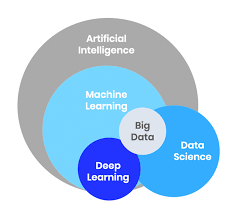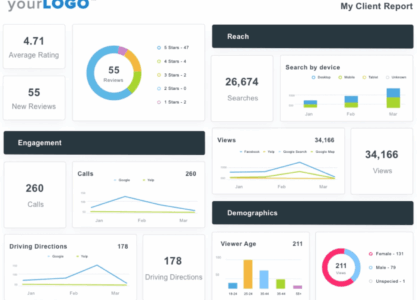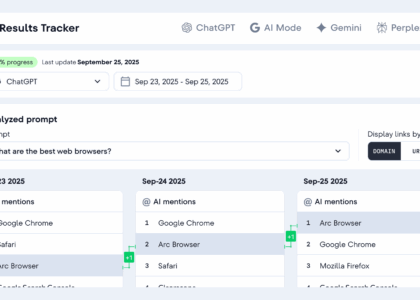Artificial Intelligence and Data Science: A Synergistic Relationship
In recent years, the fields of artificial intelligence (AI) and data science have become increasingly intertwined, driving significant advancements across various industries. Both disciplines rely on data to generate insights and make informed decisions, yet they approach problems from different angles. Understanding the synergy between AI and data science is essential for leveraging their full potential.
The Role of Data Science
Data science involves extracting meaningful insights from large volumes of data. It encompasses a range of techniques, including statistical analysis, machine learning, and data visualisation. Data scientists are tasked with cleaning, processing, and analysing data to identify patterns and trends that can inform business strategies or scientific research.
Data science is crucial in today’s data-driven world as it helps organisations make sense of the vast amounts of information they collect. By uncovering hidden patterns within datasets, businesses can improve decision-making processes, enhance customer experiences, and optimise operations.
The Impact of Artificial Intelligence
Artificial intelligence refers to the development of computer systems capable of performing tasks that typically require human intelligence. These tasks include speech recognition, image analysis, decision-making, and language translation. AI technologies are powered by algorithms that learn from data to improve their performance over time.
AI has transformed numerous sectors by automating routine tasks and providing intelligent solutions to complex problems. For instance, in healthcare, AI systems assist in diagnosing diseases with higher accuracy than traditional methods. In finance, AI algorithms detect fraudulent activities by analysing transaction patterns in real-time.
The Intersection of AI and Data Science
The integration of AI into the realm of data science has led to remarkable innovations. While data science focuses on understanding past trends through historical data analysis, AI uses this knowledge to predict future outcomes and automate decision-making processes.
Machine learning—a subset of AI—is a key component in this collaboration. It enables computers to learn from large datasets without explicit programming instructions. By employing machine learning algorithms within data science frameworks, organisations can build predictive models that drive smarter business decisions.
Real-World Applications
The combination of artificial intelligence and data science is evident in several real-world applications:
- E-commerce: Personalised recommendations based on user behaviour are powered by machine learning models trained on extensive datasets.
- Healthcare: Predictive analytics help identify patients at risk for certain conditions before symptoms manifest.
- Manufacturing: Predictive maintenance systems use sensor data combined with machine learning algorithms to anticipate equipment failures before they occur.
- Marketing: Customer segmentation allows businesses to tailor marketing campaigns more effectively using insights derived from consumer behaviour analysis.
The Future Outlook
The future holds immense promise for both artificial intelligence and data science as technologies continue evolving rapidly alongside growing volumes of available information worldwide—often referred simply as “big-data”. As computational power increases alongside algorithmic advancements such as deep-learning techniques; we can expect even greater breakthroughs at their intersection—transforming industries beyond our current imagination!
This dynamic duo will undoubtedly play a pivotal role shaping our digital landscape—empowering organisations globally harness power contained within vast sea-of-data unlocking unprecedented opportunities innovation growth prosperity alike!
Exploring Artificial Intelligence in Data Science: Career Insights, Salaries, and Key Concepts
- How is artificial intelligence used in data science?
- What is the salary of AI data science?
- How to become an AI data scientist?
- Is AI data science a good career?
- What is AI data science salary?
- What are the 4 types of AI?
How is artificial intelligence used in data science?
Artificial intelligence is used in data science to enhance the analysis and interpretation of complex datasets, enabling more accurate predictions and insights. AI technologies, such as machine learning algorithms, are employed to automate the process of identifying patterns and trends within large volumes of data. This allows data scientists to build predictive models that can forecast future outcomes based on historical information. Additionally, AI techniques like natural language processing and computer vision are utilised to analyse unstructured data, including text and images, further enriching the scope of data science applications. By integrating AI into data science workflows, organisations can achieve greater efficiency and precision in decision-making processes across various industries.
What is the salary of AI data science?
The salary of professionals in the field of AI data science can vary significantly based on factors such as experience, education, location, and the specific industry they work in. Generally, AI data scientists are well-compensated due to the high demand for their skills and expertise. In the UK, entry-level positions typically offer salaries starting from £30,000 to £45,000 per year. With several years of experience, mid-level professionals can expect to earn between £50,000 and £80,000 annually. Senior data scientists or those with specialised skills in artificial intelligence may command salaries exceeding £100,000 per year. Additionally, roles in major tech hubs or within leading technology firms often offer higher remuneration packages to attract top talent.
How to become an AI data scientist?
Becoming an AI data scientist requires a blend of education, skills, and practical experience. Typically, one should start with a strong foundation in mathematics and statistics, as these are crucial for understanding algorithms and data analysis. Pursuing a degree in computer science, data science, or a related field is often beneficial. Gaining proficiency in programming languages such as Python or R is essential, as they are widely used in data manipulation and machine learning tasks. Familiarity with machine learning frameworks like TensorFlow or PyTorch is also advantageous. Practical experience can be acquired through internships, projects, or contributing to open-source initiatives. Additionally, staying updated with the latest advancements in AI and continually developing one’s skill set through online courses or workshops can significantly enhance career prospects in this rapidly evolving field.
Is AI data science a good career?
Pursuing a career in AI data science is considered an excellent choice, given the increasing demand for skilled professionals in this rapidly evolving field. As organisations across various industries continue to leverage data-driven insights and automation powered by artificial intelligence, the need for experts who can develop, implement, and manage these technologies has surged. A career in AI data science offers not only competitive salaries but also opportunities to work on cutting-edge projects that can significantly impact business strategies and societal advancements. Moreover, the interdisciplinary nature of AI data science allows professionals to apply their skills in diverse sectors such as healthcare, finance, retail, and more, ensuring a dynamic and rewarding career path with plenty of room for growth and innovation.
What is AI data science salary?
The salary for professionals in the field of AI and data science can vary significantly depending on factors such as experience, education, location, and industry. Generally, these roles are highly sought after due to the increasing demand for expertise in handling and interpreting complex data sets, as well as developing intelligent algorithms. In the UK, entry-level positions might start with salaries around £30,000 to £40,000 per year. However, experienced data scientists or AI specialists can earn upwards of £70,000 annually, with senior roles often exceeding £100,000. Industries such as finance and technology tend to offer higher salaries compared to others. Additionally, possessing specialised skills in machine learning or deep learning can further enhance earning potential in this rapidly evolving field.
What are the 4 types of AI?
Artificial intelligence (AI) can be categorised into four distinct types, each representing a different level of capability and sophistication. The first type is “Reactive Machines,” which are the most basic form of AI systems. They are designed to perform specific tasks without memory or the ability to use past experiences to inform future actions, such as IBM’s Deep Blue chess-playing computer. The second type is “Limited Memory” AI, which can store previous data and use it to make informed decisions; this is commonly seen in self-driving cars that observe and react based on historical data. The third type, “Theory of Mind,” refers to AI systems that understand emotions, beliefs, intentions, and thought processes—an area still largely under research and development. Lastly, “Self-aware” AI represents the most advanced form of artificial intelligence, where machines possess consciousness and self-awareness; however, this remains a theoretical concept at present rather than a practical reality.






